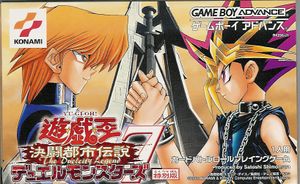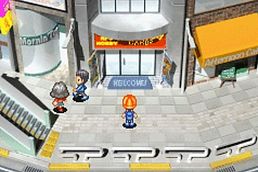Difference between revisions of "Yu-Gi-Oh! The Sacred Cards"
(→Storyline) |
|||
| Line 26: | Line 26: | ||
An interesting Konami 'cameo' in this game is the Miracle Moon music in the Arcade, which is taken from the Beatmania series of games. | An interesting Konami 'cameo' in this game is the Miracle Moon music in the Arcade, which is taken from the Beatmania series of games. | ||
| − | + | Penis | |
| − | |||
| − | |||
| − | |||
| − | |||
| − | |||
| − | |||
==Reception== | ==Reception== | ||
Revision as of 03:46, 6 November 2010
An RPG-style game for the Game Boy Advance, Yu-Gi-Oh! The Sacred Cards known as Yu-Gi-Oh! Duel Monsters 7: The Duel City Legend in Japan, offered fans the unprecedented opportunity to use the Egyptian Gods, albeit with altered effects to adhere to the game's simplified gameplay mechanics.
The story of the game loosely followed the Battle City story arc of the anime and manga, with adjustments to allow the player to act the part of a major character and participate all the way into the Battle City Finals.
One important thing to note is that the game automatically cuts to the ending sequence immediately after the defeat of Marik Ishtar, with no option to save. Because of this, any money or rare cards earned in the final duel are irrelevant, and the player never has an opportunity to use The Winged Dragon of Ra without the use of a game-hacking device. The only way to do this normally is to allow Marik to Summon Ra and destroy it (or somehow discard it from the hand), then Special Summon it from the graveyard. Also noticeable that even in the English version of the game, most of the cards have their original OCG artworks like "Soul of the Pure", "Monster Reborn", and "Last Day of Witch".
An interesting Konami 'cameo' in this game is the Miracle Moon music in the Arcade, which is taken from the Beatmania series of games.
Penis
Reception
Yu-Gi-Oh! The Sacred Cards received mediocre reviews with an average of 59% on Game Rankings.[1] It was criticized for its shortness.
However, the game sold nearly 1 million units, with 750,000 copies in the United States [2] and over 238,000 in Japan,[3] and received a sequel known as Yu-Gi-Oh! Reshef of Destruction. Its sequel increased the game's difficulty and length by raising the card restrictions. However, it is considered too difficult for the wrong reasons.
The sequel to this game is Yu-Gi-Oh! Reshef of Destruction.
Anime/Manga Cards
Game Guides
- Main article: Yu-Gi-Oh! Duel Monsters 7: The Duel City Legend Game Guide 1
- Main article: Yu-Gi-Oh! Duel Monsters 7: The Duel City Legend Game Guide 2
Japanese Promo Cards
- Main article: GameBoy Duel Monsters Promos: Series 7

